Compensation and Pension examinations, also known as “C&P exams,” are frequently used by the VA when deciding veterans’ disability claims. Specifically, the VA uses C&P exams as part of its duty to assist in order to diagnose conditions, rate disabilities, and to determine service connection issues.
Because C&P examinations are so common, it is important that veterans understand what to expect when attending a C&P exam and that veterans are as prepared as possible prior to attending the exams.
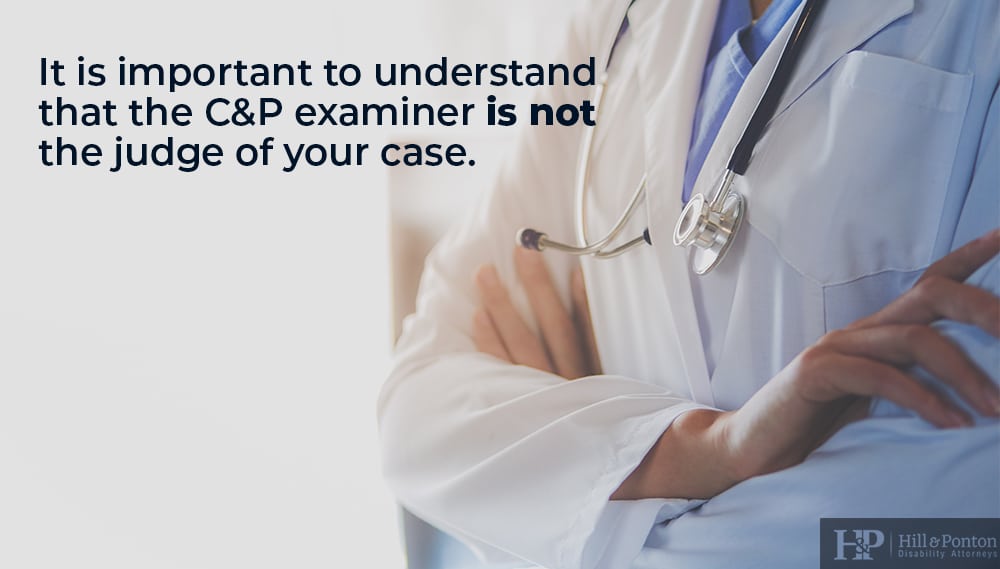
What Can You Expect from Your C&P Exam?
The first thing that is important to understand is that the C&P examiner is not the judge of your case. The examiner writes a report that is forwarded to the VA Regional Office and there an adjudicator reviews it and makes the decision.
Here is what you can expect before, during, and after the C&P exam.
Before The Exam
When the VA schedules a C&P examination, the veteran will receive written notice of the date, time, and location of the exam. Unfortunately, it is not always clear what type of examination the veteran will undergo, especially if there are multiple claims pending at the same time.
If the veteran does not receive notice of a C&P exam for some reason and discovers this after the fact, he/she should request that the VA reschedule the exam, and give a good faith reason in writing why the exam was missed (i.e. change of address, no transportation, in the hospital, etc.).
Before going to your examination, think about the conditions for which you are going to be examined and try to document on a piece of paper all of your activities that are impacted by your condition.
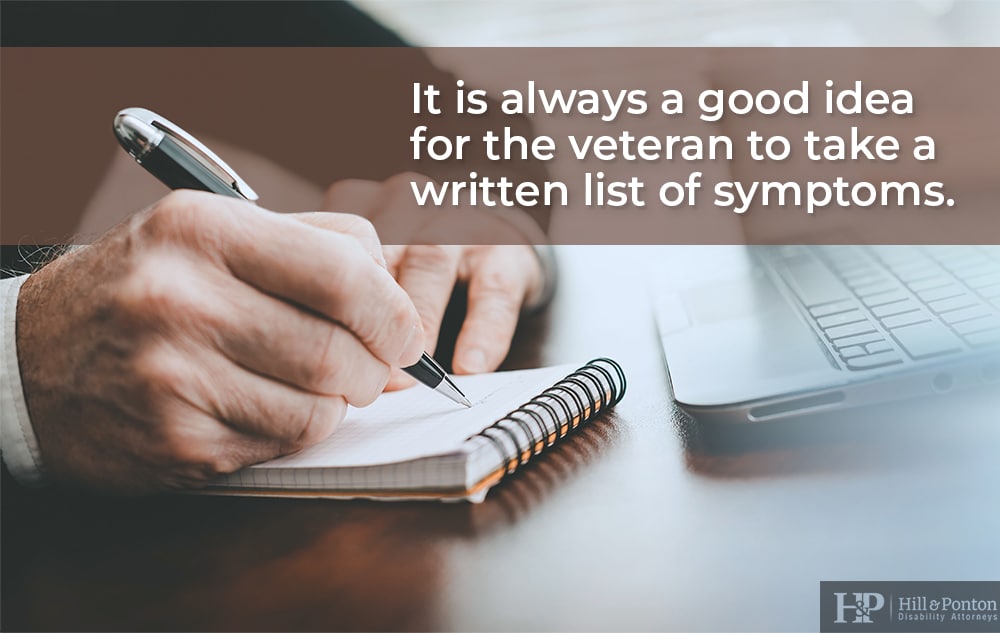
It is always a good idea for the veteran to take a written list of symptoms, including embarrassing symptoms, to help refresh his/her memory during the exam. What veterans sometimes feel are inconsequential details could very well be the key to success in the claim.
Additionally, if one of the veteran’s treating medical providers has provided a favorable opinion in the matter, it does not hurt for the veteran to give the favorable opinion to the C&P examiner for consideration.
During the Exam
C&P exams typically take place at a VA medical center or clinic. The VA recommends arriving at least 15 minutes early to the facility. There are a few steps you can take to help make the examination go smoothly.
Bring a Witness
It is always a good idea for the veteran to take a witness to the examination. A few examples of great witnesses are spouses, adult children, or close friends. A witness is important because it is very easy for veterans to forget important details about the exam, let alone deal with the normal stress that veterans experience when being evaluated by the VA’s C&P examiners.
If possible, the veteran should take the witness into the examination room with them; however, this request is frequently denied by the VA. If the request to take a witness into the examination is denied, it is important that the veteran maintain composure, and proceed with the exam.
Failure to cooperate with a C&P examination can result in denial of the claim. At the very least, the veteran should ask for the examiner’s business card, so that the veteran can ensure that the person doing the examination was actually the one who wrote the final report.
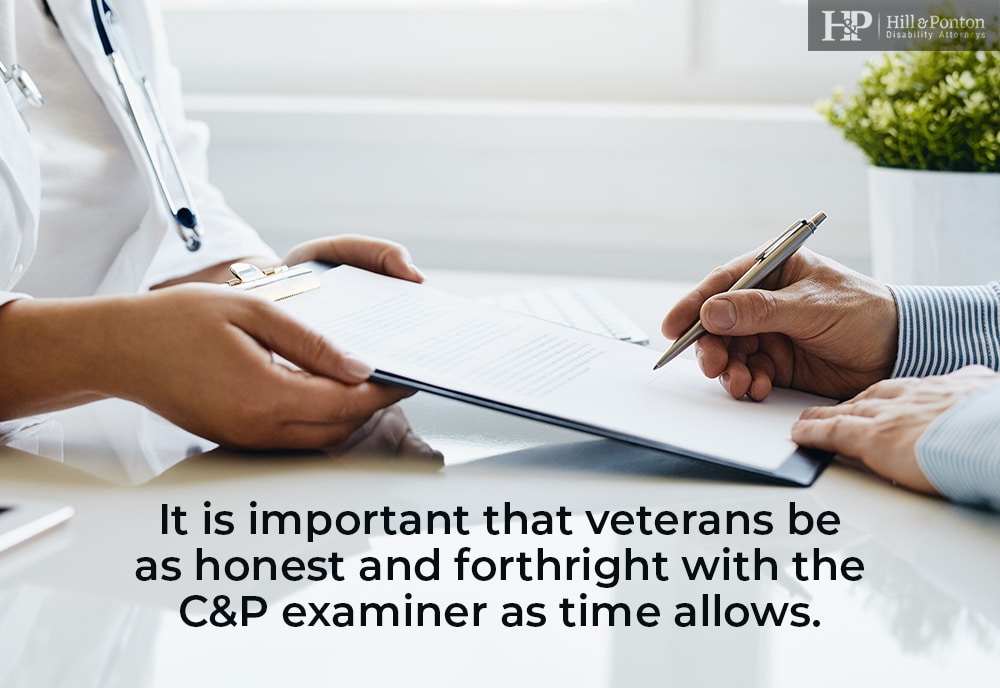
Be Honest With The Examiner
It is important to know that C&P examiners are literally examining thousands of veterans per year, and most of the examiners simply do not have the patience, time, or resources to try to decipher how a veteran really feels or to dig deep to figure out what the veterans symptoms really are. As such, it is important that veterans be as honest and forthright with the C&P examiner as time allows.
Be thoughtful to your responses to the questions posed. For example, if the doctor asks you, “How are you today?” Your automatic response is probably, “I am fine, how are you?” This is not a social occasion and you are not there to get to know the doctor. After the initial salutations, keep in mind that whatever you say that day may be permanently written in your medical file and submitted as evidence in support of your claim.
Provide Details About Your Symptoms
During your examination, be truthful with your symptoms and give examples of any limitations that the symptoms cause. Know that you are seeing this physician for the first time, and some of the issues you may have to discuss are uncomfortable, but it is important to your claim that you disclose all of the symptoms and limitations to the best of your knowledge.
If you have a physical disability, the doctor is required to examine you and perform range of motion testing, strength testing and reflex testing, among other, as appropriate. The examination may cause physical discomfort or pain, but remember that the doctor is trained to determine when and where your limitations lie and you should not feel pressured to bend or flex any further than your pain and symptoms allow. Make sure you explain why you have reached your limit and where the pain is located.
If you have a mental health disability, focus on your condition and how it affects your daily activity, as well as those around you. If it involves a specific experience or event in the service, it may be difficult to discuss it. However, the outcome of your claim is at stake and this is your opportunity to document your experience, symptoms and residuals from the event in service. The doctor may also administer a written test to evaluate any neuropsychological deficit. These tests are crucial to brain injury examinations, or any other type of cognitive impairment.
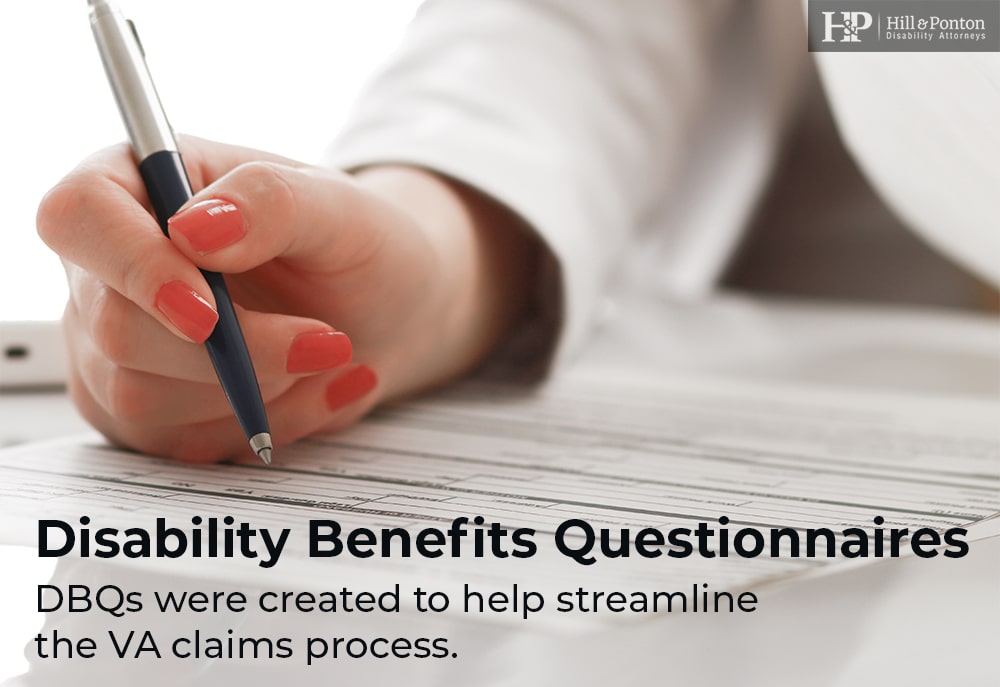
A Note on Disability Benefits Questionnaires (DBQs)
Recently, the VA has really begun to heavily advocate the use of Disability Benefits Questionnaires (DBQs) by the C&P examiners. The VA has said that the DBQs were created to help streamline the VA claims process, and to help complete the record if they determine that the record as a whole is incomplete or insufficient to decide a claim.
According to the VA, there are more than 70 DBQs, covering the overwhelming majority of conditions for which a veteran can receive disability compensation. In addition to C&P examiners, DBQs can also be completed by treating medical providers and independent medical examiners.
After The Exam
After the C&P exam, the doctor will type a report that should include information about your medical history, examination findings, and severity of your symptoms. The doctor should render an informed opinion on the condition he was asked to examine. He should also provide a rationale to support his conclusion.
The doctor does not make the decision about your claimed disability. His report will be sent to the VA Regional Office where you submitted your application for benefits. The Regional Office will make the decision about your disability, its rating, and effective date, not the doctor.
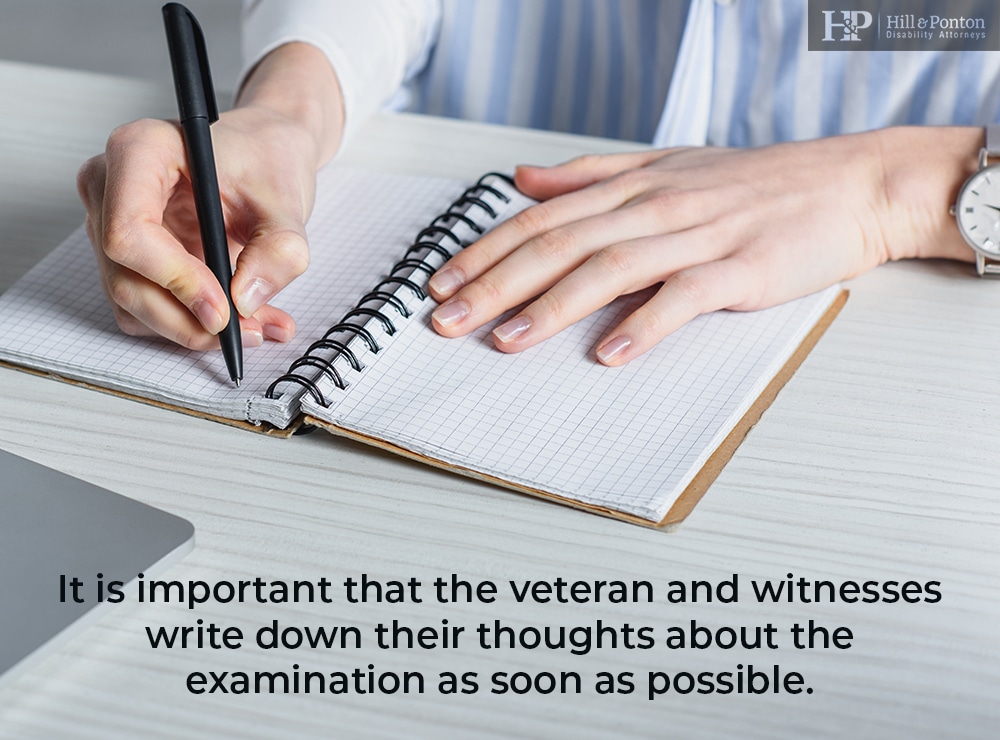
Document Your Experience
It is important that the veteran and witnesses write down their thoughts about the examination as soon as possible. Issues to consider in this regard include:
- Whether the exam was thorough
- Whether the veteran was able to express all of his/her thoughts about the disabilities being evaluated
- Whether the examiner seemed to be listening and writing down the veteran’s responses
- Whether the examiner expressed a negative opinion to the veteran about the strength of his/her claim, etc.
The more specific the veteran and the witnesses are regarding any deficiencies with the C&P exams, the better chances of getting the VA to correct the problem. Depending on the situation, the veteran or his representative may choose to send in a response to the VA challenging the C&P results. The written response may request several things, for example, that the VA order a new C&P examination with a different C&P examiner and/or that the VA order the C&P examiner to clarify his/her opinion.
The bottom line is that C&P exams are not always bad for veterans. In fact, if favorable, these exams can be very helpful. However, being an informed participant and adequately preparing for the examination is crucial.
FAQs About C&P Exams
There are some common questions that veterans may have about compensation and pension exams.
What Happens If I Don’t Attend The Exam?
Not attending your exam could negatively affect the outcome of your claim. As mentioned before, these exams are used to assess your disability and provide evidence to decide your claim. The VA will decide the claim based on the evidence that is provided and you may end up with a denied claim. On the other hand, there may be a time where you are unable to attend your exam. You can ask for the exam to be rescheduled; however, it needs to be within good reason. Nevertheless, you should make every effort to attend the exam.
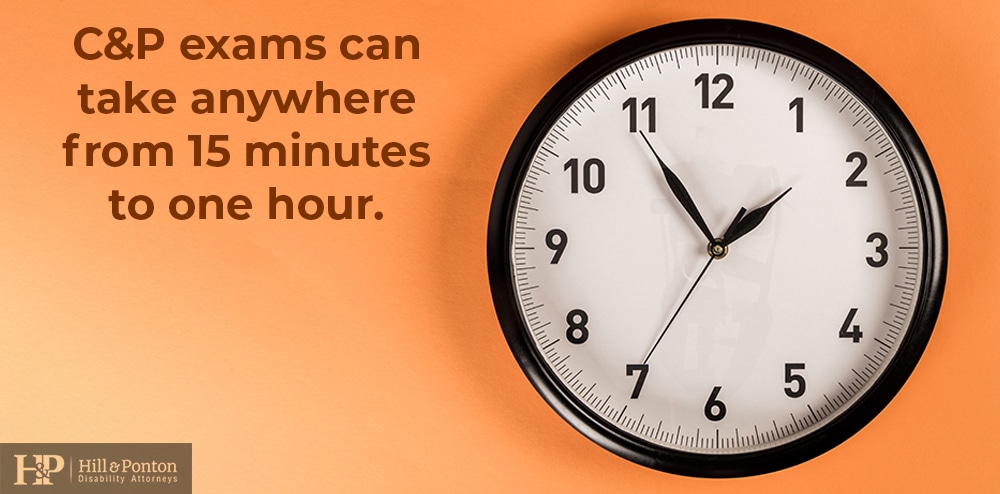
How Long Do C&P Exams Take?
According to the VA, C&P exams can take anywhere from 15 minutes to one hour. The length of your exam will vary for each veteran.
What If I’m Making a Claim for More Than One Condition?
If you have multiple conditions, the VA may require that you attend a separate C&P exam for each condition. However, this can depend on which conditions you have.
Can I Bring New Evidence to My Exam?
If you have medical evidence or treatment records that you didn’t include in your original claim, you can bring them to the C&P exam. However, you should still submit that evidence to the VA for your claim. The examiner may not be able to submit evidence to the VA for you.
Does The VA Ever Require Reexaminations?
Veterans with certain medical conditions may require a second C&P exam in the future. The VA typically requires a reexamination if a veteran has a condition that may improve in the future. They will assess the current level of disability and determine if the veteran’s disability rating still applies.
Remember, this is the time where you can physically show how your disability is affecting you. You can look at this as an opportunity. Go into your exam prepared and ready to go. This does not have to be a negative experience. You now have the knowledge and can better prepare yourself for your compensation and pension exam.
If you disagree with your VA disability rating, the attorneys at Hill & Ponton are here to help. Contact us today for a free case evaluation.


